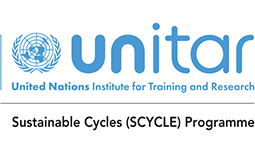About
HISTORY
Since January 2022, Sustainable Cycles (SCYCLE) is a Programme under UNITAR’s Division for Planet. This transition to UNITAR follows being a Programme under UNU-ViE since 2016, UNU-IAS and UNU-ISP Operating Unit SCYCLE, and the former European Focal Point of the Zero Emissions Forum since the 2000s.
Read more about UNITAR: www.unitar.org
MISSION
SCYCLE’s mission is to promote sustainable societies. Its activities focus on the development of sustainable production, consumption and disposal patterns for electrical and electronic equipment (EEE), as well as for other ubiquitous goods. SCYCLE leads the global e-waste discussion and advances sustainable e-waste management strategies based on life-cycle thinking.
VISION
SCYCLE’s vision is to enable societies to reduce the environmental load of production, including but not limited to the use and disposal of electrical and electronic equipment, to sustainable levels through independent, comprehensive, and practical research that provides facts for more thorough policy development and decision-making.
OBJECTIVES
- SCYCLE fosters solutions-oriented dialogue, cooperation, and consensus. Within this context, SCYCLE accomplishes the following:
- Conducts research on eco-structuring towards sustainable societies
- Develops interdisciplinary and multi-stakeholder public-private partnerships
- Assists governments in developing e-waste legislation and standards
- Responsible for education, training, and capacity development; and
- Facilitates and disseminates practical, science-based recommendations to the United Nations and its agencies, governments, scholars, industries, and the public.
Vacancy Announcements at UNITAR:
www.unitar.org/vacancy-announcementsHead UNITAR Bonn Office & Manager SCYCLE Programme
 Prof. Dr. Ruediger Kuehr was appointed Head of the Bonn office of the United Nations Institute for Training and Research (UNITAR) in June 2020 and is also Manager of the Sustainable Cycles Programme (SCYCLE). While being hosted by United Nations University (UNU) through 2021, Ruediger functioned as SCYCLE’s Director. From 2007-2017, he was also Executive Secretary of the Solving the E-Waste Problem (StEP) Initiative, which aims to initiate and develop fair and environmentally safe solutions to the e-waste problem through analysis, planning, and pilot projects in joint cooperation with industries, governments, academia, and NGOs.
Prof. Dr. Ruediger Kuehr was appointed Head of the Bonn office of the United Nations Institute for Training and Research (UNITAR) in June 2020 and is also Manager of the Sustainable Cycles Programme (SCYCLE). While being hosted by United Nations University (UNU) through 2021, Ruediger functioned as SCYCLE’s Director. From 2007-2017, he was also Executive Secretary of the Solving the E-Waste Problem (StEP) Initiative, which aims to initiate and develop fair and environmentally safe solutions to the e-waste problem through analysis, planning, and pilot projects in joint cooperation with industries, governments, academia, and NGOs.
Dr. Kuehr is an Adjunct Professor at the University of Limerick (Ireland) in the Department of Electronics & Computer Engineering in recognition of his distinctions and achievements.
Since 1999, Dr. Kuehr has served in various positions within United Nations University, such as Head of UNU-IAS SCYCLE, Head of UNU-ISP-SCYCLE, and Head of the UNU Zero Emissions Forum (ZEF) – European Focal Point. From 2000 to 2002, he was Secretary to the Alliance for Global Eco-Structuring (AGES) under UNEP’s Cleaner Production Network.
Dr. Kuehr has authored, co-authored, edited, and co-edited several books, studies, and proceedings, including the Global E-waste Monitors of 2020, 2017, and 2015; Global Transboundary E-waste Flows Monitor 2022; Regional E-waste Monitors for Latin America (2022), the Arab States (2021), the Commonwealth of Independent States & Georgia (2021), and East and Southeast Asia (2016); Japan’s transnational environmental policy (2011); E-waste: From Recycling to Resources (2010); and Computers and the Environment: Understanding and Managing their Impacts (2004), whose research results have received worldwide acclaim. He also publishes and lectures on topics such as environmental technology transfer, transnational environmental policies, strategic sustainable development, and development cooperation.
A political and social scientist by education, with a PhD (Dr. rer. pol.) from the University of Osnabrück (Germany) and a MA from the University of Münster (Germany), and additional post-graduate studies in Tokyo and Berlin, Dr. Kuehr has served as Senior R&D Specialist with The Natural Step in Sweden and as a freelance policy consultant to various national governments, international organisations, and companies. He was a visiting fellow to the Free University of Berlin (Germany) and Hitotsubashi University (Japan) as well as a Research Associate to the Japan Research Centre of the University of Osnabrück (Germany).
Ruediger has in-depth expertise in environmental and sustainability policies from a life cycle perspective, i.e. natural resources, product design, and use and end of life. Over the past 20 years, he has supervised many projects for the UN, EU, and other international and national governments on all continents and has partnered with industry players and leading research institutions around the globe. This work centred mainly on e-waste and other waste management, industrial symbiosis, cleaner production, technology transfer, resource management, and, most recently, the circular economy.
Dr. Kuehr is a strong advocate of innovative implementation of the UN’s Sustainable Development Goals. He has demonstrated leadership in heading UN organisations in Germany and their projects carried out on global, regional, and local levels, converting their deliverables into concrete action.
